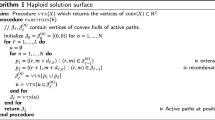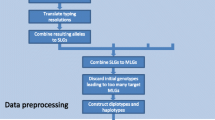Abstract
Driven by the international HapMap project, the haplotype inference problem has become an important topic in the computational biology community. In this paper, we study how to efficiently infer haplotypes from genotypes of related individuals as given by a pedigree. Our assumption is that the input pedigree data may contain de novo mutations and missing alleles but is free of genotyping errors and recombinants, which is usually true for tightly linked markers. We formulate the problem as a combinatorial optimization problem, called the minimum mutation haplotype configuration (MMHC) problem, where we seek haplotypes consistent with the given genotypes that incur no recombinants and require the minimum number of mutations. This extends the well studied zero-recombinant haplotype configuration (ZRHC) problem. Although ZRHC is polynomial-time solvable, MMHC is NP-hard. We construct an integer linear program (ILP) for MMHC using the system of linear equations over the field F(2) that has been developed recently to solve ZRHC. Since the number of constraints in the ILP is large (exponentially large in the general case), we present an incremental approach for solving the ILP where we gradually add the constraints to a standard ILP solver until a feasible haplotype configuration is found. Our preliminary experiments on simulated data demonstrate that the method is very efficient on large pedigrees and can infer haplotypes very accurately as well as recover most of the mutations and missing alleles correctly.
Access this chapter
Tax calculation will be finalised at checkout
Purchases are for personal use only
Preview
Unable to display preview. Download preview PDF.
Similar content being viewed by others
References
Abecasis, G.R., Cherny, S.S., Cookson, W.O., Cardon, L.R.: Merlin — rapid analysis of dense genetic maps using sparse gene flow trees. Nature Genetics 30(1), 97–101 (2002)
Albers, C.A., Heskes, T., Kappen, H.J.: Haplotype inference in general pedigrees using the cluster variation method. Genetics 177(2), 1101–1116 (2007)
Badaeva, T.N., Malysheva, D.N., Korchagin, V.I., Ryskov, A.P.: Genetic variation and De Novo mutations in the parthenogenetic caucasian rock lizard Darevskia unisexualis. PLoS ONE 3(7), e2730 (2008)
Baruch, E., Weller, J.I., Cohen-Zinder, M., Ron, M., Seroussi, E.: Efficient inference of haplotypes from genotypes on a large animal pedigree. Genetics 172(3), 1757–1765 (2006)
Ellegren, H.: Microsatellite mutations in the germline: Implications for evolutionary inference. Trends in Genetics 16(12), 551–558 (2000)
Gusfield, D.: Inference of haplotypes from samples of diploid populations: Complexity and algorithms. J. Computational Biology 8(3), 305–323 (2001)
Kimura, M., Crow, J.F.: The number of alleles that can be maintained in a finite population. Genetics 49, 725–738 (1964)
Lander, E.S., Green, P.: Construction of multilocus genetic linkage maps in humans. In: Proc. of the National Academy of Sciences. Genetics, vol. 84, pp. 2363–2367 (1987)
Li, J., Jiang, T.: Efficient inference of haplotypes from genotypes on a pedigree. J. Computational Biology 1(1), 41–69 (2003)
Li, J., Jiang, T.: Computing the minimum recombinant haplotype configuration from incomplete genotype data on a pedigree by integer linear programming. J. Computational Biology 12(6), 719–739 (2005)
Li, J., Jiang, T.: A survey on haplotype algorithms for tightly linked markers. J. Bioinformatics and Computational Biology 6(1), 241–259 (2008)
Liu, L., Jiang, T.: Linear-time reconstruction of zero-recombinant mendelian inheritance on pedigrees without mating loops. Genome Informatics 19, 95–106 (2007)
Niu, T., Qin, Z.S., Xu, X., Liu, J.S.: Bayesian haplotype inference for multiple linked single-nucleotide polymorphisms. Am. J. Hum. Genet. 70(1), 157–169 (2002)
Olson, T.M., Doan, T.P., Kishimoto, N.Y., Whitby, F.G., Ackerman, M.J., Fananapazir, L.: Inherited and de novo mutations in the cardiac actin gene cause hypertrophic cardiomyopathy. J. Molecular and Cellular Cardiology 32(9), 1687–1694 (2000)
Qian, D., Beckmann, L.: Minimum-recombinant haplotyping in pedigrees. Am. J. Hum. Genet. 70(6), 1434–1445 (2002)
Sobel, E., Lange, K., O’Connell, J.R., Weeks, D.E.: Haplotyping algorithms. In: Speed, T., Waterman, M.S. (eds.) Genetic Mapping and DNA Sequencing. IMA Volumes in Mathematics and its Applications, vol. 81, pp. 89–110. Springer, Heidelberg (1996)
Stephens, M., Smith, N.J., Donnelly, P.: A new statistical method for haplotype reconstruction from population data. Am. J. Hum. Genet. 68(4), 978–989 (2001)
Tapadar, P., Ghosh, S., Majumder, P.P.: Haplotyping in pedigrees via a genetic algorithm. Human Heredity 50(1), 43–56 (2000)
The Internaltional HapMap Consortium. The international HapMap project. Nature 426, 789–796 (2003)
Wang, S., Kidd, K.K., Zhao, H.: On the use of DNA pooling to estimate haplotype frequencies. Genetic Epidemiology 24(1), 74–82 (2003)
Xiao, J., Liu, L., Xia, L., Jiang, T.: Fast elimination of redundant linear equations and reconstruction of recombination-free mendelian inheritance on a pedigree. In: 18th Annual ACM-SIAM Symposium on Descrete Algorithms, pp. 655–664 (2007)
Yang, Y., Zhang, J., Hoh, J., Matsuda, F., Xu, P., Lathrop, M., Ott, J.: Efficiency of single-nucleotide polymorphism haplotype estimation from pooled DNA. Proc. of the National Academy of Sciences 100, 7225–7230 (2002)
Zhang, K., Sun, F., Zhao, H.: HAPLORE: A program for haplotype reconstruction in general pedigrees without recombination. Bioinformatics 21(1), 90–103 (2005)
Author information
Authors and Affiliations
Editor information
Editors and Affiliations
Rights and permissions
Copyright information
© 2009 Springer-Verlag Berlin Heidelberg
About this paper
Cite this paper
Wang, WB., Jiang, T. (2009). Efficient Inference of Haplotypes from Genotypes on a Pedigree with Mutations and Missing Alleles (Extented Abstract). In: Kucherov, G., Ukkonen, E. (eds) Combinatorial Pattern Matching. CPM 2009. Lecture Notes in Computer Science, vol 5577. Springer, Berlin, Heidelberg. https://doi.org/10.1007/978-3-642-02441-2_31
Download citation
DOI: https://doi.org/10.1007/978-3-642-02441-2_31
Publisher Name: Springer, Berlin, Heidelberg
Print ISBN: 978-3-642-02440-5
Online ISBN: 978-3-642-02441-2
eBook Packages: Computer ScienceComputer Science (R0)




